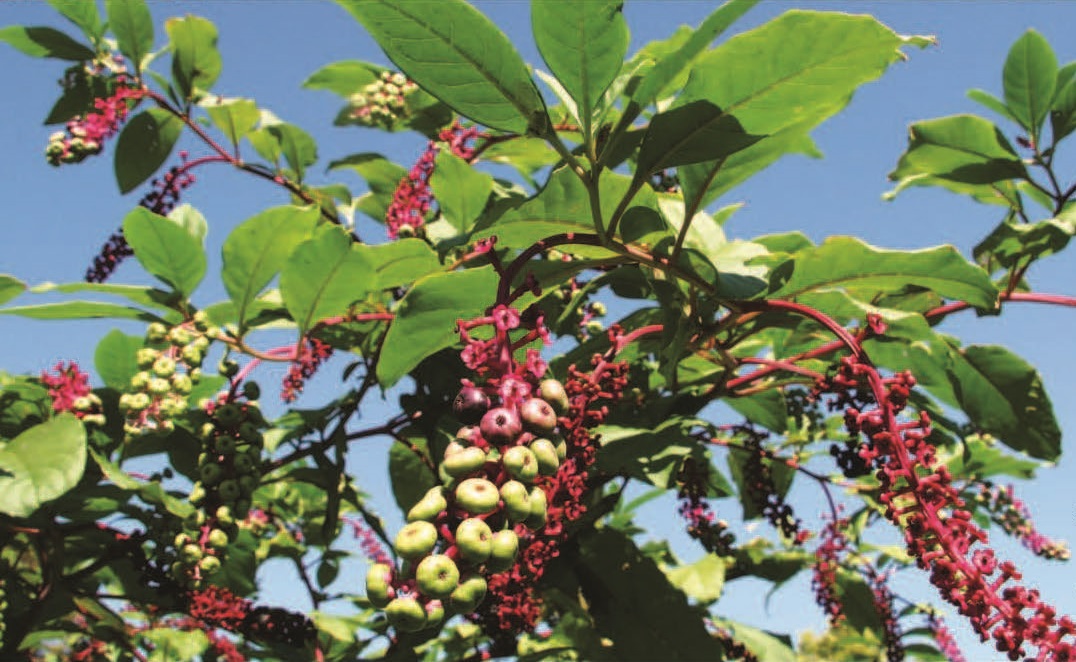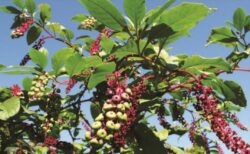Spring 2013
Poke Sallet: Pretty and Poisonous
Don’t worry—just boil it three times
Published: May 4, 2021
Last Updated: August 23, 2021

Southerners who dine on pokeweed know to avoid the berries. Instead, they harvest the younger leaves and shoots and boil out the toxins before ingesting a “poke sallet” mixture often featuring bacon grease. Scrambled eggs are another recommended complement. The plant’s toxins, according to scientific research, are water soluble, so the long tradition of boiling the leaves apparently does help considerably. The shoots are sometimes described as tasting like a poor man’s asparagus.
One region’s toxic weed is another’s tasty green. Southern Ag centers downplay the toxicity while mentioning how to safely prepare the weed for dining. Alabama’s Cooperative Extension Service does break ranks in its “Don’t Eat Poke Salad” pamphlet, which questions why one would seek to eat a poisonous plant when so many non-toxic alternatives are available.
If nutritionists knock a diet heavy on soul food as unhealthful, then a folk food that can kill with a single serving must be the most soulful of all foods. The power of tradition cannot always be understood. Poke’s history reveals a parallel record as both helpful plant and health hazard. The term “poke” is thought to have originated from the Algonquian word pocan, which refers both to the berry and the plant. Native Americans used pocan for dyeing baskets and other items. The term “sallet” was an Old English spelling for salad. The weed can be found as far north as Minnesota as well as in the Southwest, and it has made appearances in the writings of Eudora Welty and Walt Whitman.
Medicinal uses, often via topical application, can be found in 19th-century newspaper accounts. Claims of cancer cures also emerged every so often, as did reports of children and others poisoned by the weed. In the 1830s, newspapers reported the death of an Ohio boy who had eaten the root; his siblings survived. In 1851, a Cincinnati man poisoned his family after bringing home pokeweed from a city market. All were affected, but none died. Ongoing research into the plant may reveal some modern, medicinal applications.
The plant is famous for being harvested in the wild, but canned versions were sold commercially beginning in the mid-1900s. Arkansas’ Allen Canning Company offered Poke Salet (another alternative spelling), with the label proudly proclaiming the leaves were “organically grown.” Perhaps the marketing department wanted to banish consumers’ thoughts about dangerous chemicals lurking inside the can. However, it proved too difficult to procure enough of the plant to make the product worth the Allen Company’s while, and they stopped canning the green in 2000.
Not surprisingly, festivals celebrating the green seem to appear only in Southern states, notably Kentucky, Tennessee and Alabama. Louisiana once boasted two festivals, but now only the original one in Blanchard remains. Residents of the small town below Shreveport hosted their first festival in the mid-1970s. At times, organizers had to rely on Texas pokeweed, but the festival has grown well beyond its origins in a local church. By 1980, a bumper crop year for poke, several thousand people turned out for the festival.
Louisiana’s other Poke Salad Festival, once staged in Oak Grove, featured a variant of the older spelling: salot. Oak Grove is the hometown of the singer-songwriter responsible for a pop hit in 1969 that put poke sallet on the map, but with a spelling that seemed to aim for greater success among country and pop music fans. The publishers were right; the song “Poke Salad Annie” achieved even more renown once Elvis Presley released his cover version. Best known as the author of “Rainy Night in Georgia,” Tony Joe White is one of the many Louisiana musicians seemingly better appreciated by foreign audiences. Often counted among the slew of swamp pop musicians, White now lives outside of Nashville when not touring in Europe, New Zealand, and other far-flung regions.
Surprisingly, few of the avant-garde southern chefs seem to have glommed onto what might become one of the most loco of locavore trends.
